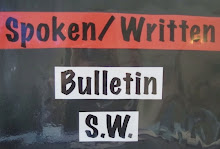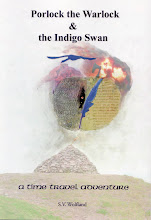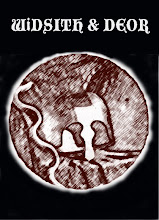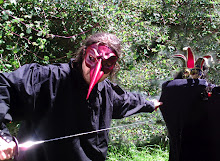
For the Beautiful Days Festival, we had a crew of five from the Collective - ourselves Widsith & Deor, Andi and Mandy of Freeplay, and Liz of MerryMaker.co.uk (individual website under construction). Working for Majical Youth, we had a marquee in the Craft area and slots in the Storytelling Circle in the 'Under the Redwoods' performance space between 6 and 9pm each evening.
At first I must confess to thinking (having been back home for all of three days) 'oh no, not another one', but actually... Andi and Mandy arrived for a quick cup of tea and to kindly take some of the supplies, and - after a while as her train was delayed - we picked up Liz from the station (as she had come up from Penzance), having packed the storytelling van full of leather, sheepskins, cow hide, tools, carnival heads and posts, bodymasks, fabric, and cooking gear - i.e. all the necessary stuffs for storytelling, workshops, event decor, and being out of doors for days. Plus books in case we got a chance to sell. Then fitted in all Liz's gear, and off we went.
Thursday was marquee decoration and Freeplay did a splendid job, the place a palace of drapes and cut bunting, finished off by their big fabric sign and our carnival heads on poles. It rained a lot in the night, and we were allotted a parking space on a steep slope and not given any blocks, so it was a struggle whenever the back doors were opened not to let the sleeping bags shoot out onto the floor! But on the other hand, it was a great spot in other ways - because it was right at the back of the crew camping, with access to the tea tent over the way, two vans away from the rest of our own Collective crew, and right next to a secret back entrance into the field with the main arena, so within five metres, one overlooked the main stage!
The workshops - a lunchtime session on Friday, and two mornings over the weekend - went very well. Mandy offered peg loom weaving as folks made their own rag rugs! Some taking hours, others just making something small to sit on. Adults were addicted, and children amazed at their own handiwork. Andi showed folks how to make 'magic wristbands' - leather strips that wove into themselves without cutting off the end, like a mobius strip, I showed them how to make simple classic Viking plaited leather wristbands, fellow storyteller Deor (whose original workshop the whole leather one was) showed them how to make gauntlets and masks, and Liz kitted people out with carnival masks from paper, card, sequins, feathers, glue and other things. We catered for every age group, the smallest children preferring carnival masks, to middling ones wanting animal masks - mixing cardboard with cow hide - and tails! to teenagers making anklets to adults making full face creepy animal head masks, guitar straps (from rags) and one person a furry stole, and another a miniskirt/belt complete with cash pocket! Needless to say, people were very appreciative and some didn't want to leave - 'I haven't cleaned my teeth yet or anything - I just got a call from my daughter saying 'Mum, you've got to come - there's a leather workshop - you'll love it!' ' - high praise from someone who works at heaps of festivals for a living, as the latter was a comment from a stallholder who provides food at all hours to wasted festival goers throughout each summer.
Our storytelling went equally well, the host being teller John Row who organizes the storytelling tent in the Kidz Field at Glastonbury and has done for some years. We told in a circular fire space under tall trees, a twenty minute to half hour set each evening, and to my delight, we started off with people sitting in a semi circle, and as we performed, it became a full circle, and by the end, concentric rings - always a good sign.
Unlike the Buddhafield we had excellent support in the rest of the Collective, other friends were there, and we even had some time to enjoy ourselves. Meals were also Collective, and I was surprised, pleased and relieved as ever at how well we all work together. On Monday we weren't so shattered that we just had to leave (unlike some previous festivals, and despite the torrent of rain on Sunday night) so we went 'tatting' as Mandy calls it - seeking for anything useful amidst the piles of rubbish and junk left by festival goers. I know a number of people who gather tents and allsorts of stuff at the end of events and sell them afterwards. And sure enough - a green heavy duty waterproof jacket, a small foldaway umbrella (working), piles and piles of bread rolls still wrapped in plastic and packed in boxes - we asked and the hot dog place said they didn't want them, we told the kid's crew, and their caterers collected box loads! an air bed, tarpaulin, pristine pillows scented only with washing powder, solid clean bucket with handle, wooden stakes, pink organza, tableware, yellow tutu...the list went on. We each took a few useful things and shook our heads with wonder at the rest - the things people throw away...
Pleased with how our part of it went, that we were a good team, that the weather even at its worst had cleared up and been basically reasonable, and at the festival itself, we parted in good fellowship. Huge thanks to Andi, Mandy, Liz, Sam and Alex for being such a great crew and so talented/helpful, also to Bicton Ben and lovely Kate for providing extra amusement, Jackie Brown of Manic Organic, and to Helen, Jo and Majical Youth for booking us again, John Row for hosting us, Ruth for telling such great tales, and all involved in putting on such a nice and relaxed festival.





